
cover 50

cover 50
This rising pop star delivers captivating live performances with motivational songs, showcasing her unparalleled individuality.
With a dazzling stage presence, she weaves a heartfelt narrative of personal growth, self-discovery, and resilience through challenging times.
Best known for her hit “Pink Pony Club,” she has rapidly become a symbol of fearless artistic expression.
Her unforgettable Coachella performance in April 2024 propelled her into the mainstream, though her devoted fanbase had been steadily growing for years.
Through her YouTube covers, she spent her teenage years shaping her image and musical style with raw authenticity.
Themes of love, freedom, and defiance weave through her shimmering pop anthems, creating the music fans cherish today.
Audience members see her as more than just a musician—she stands as a powerful symbol in the midst of ongoing societal resistance.
For a young queer woman coming of age, she embodied the ideal pop star, representing her authentically through fearless self-expression.
One fan describes her societal influence as groundbreaking, while the queer community sees her as a guiding light and a source of inspiration.
The artist was raised in Willard, Missouri, a conservative town where she was taught that homosexuality was a sin.
Attending church three times a week, she learned from a young age to survive by concealing important parts of herself.
“It was never that I was too big for the town,” she told the BBC. “In that place, I couldn’t connect with the person I truly was.”
She shared that she couldn’t express herself—how she wanted to talk, dress, or even exist—always feeling like she was “too much.”
Moving to Los Angeles after signing a record deal opened doors to a level of freedom she never anticipated.
A night out at a gay club would soon inspire her breakout hit, “Pink Pony Club.”
Through its music, disco became more than just a night of celebration—it symbolized the moment she fully embraced herself.
She later revealed that her stage persona was more than just an act, calling it a “larger-than-life, drag queen version” of her true self.
Despite her professional success, she continued to grapple with deep psychological struggles rooted in past experiences of shame.
In an interview with Rolling Stone, she opened up about once fearing flamboyant gay people due to the beliefs instilled in her during childhood.
“People hate flamboyantly gay people because it exudes femininity, and people hate women,” she shared.
Her candid words resonated widely, as they reflected her ongoing journey of self-discovery and understanding.
She recognized that her inner turmoil was unjustified, even if she wasn’t yet ready to fully embrace it.
Despite lingering confusion, she has gained a deep sense of self-awareness—just as many of her fans have.
A concert in Ohio became the moment of public declaration that many had anticipated.
Standing before her audience, she openly affirmed her identity, saying, “I know now—nothing was wrong with me. I’m gay.”
In this moment, Chappell Roan not only took a bold step forward in her career but also embraced complete self-acceptance as her true, authentic self.